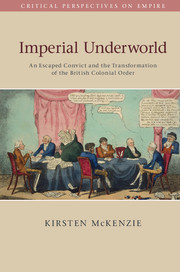Book contents
- Frontmatter
- Contents
- List of illustrations and map
- Cast of main characters
- Acknowledgements
- Map
- Introduction: ‘A soul reared in the lap of liberty’
- 1 ‘Plausible and audacious frauds’: The theatre of imperial politics and reform
- 2 ‘A Daemon behind the Curtain’: Reputation, parliamentary politics and political spin
- 3 Green-bag-makers and blood-hunters: Information management and espionage
- 4 ‘In return for services rendered’: Liberated Africans or prize(d) slaves?
- 5 ‘The dishonorable Court of Gothamites’: Corrupting abolition
- 6 ‘Under the cloak of liberty’: Seditious libel, state security and the rights of ‘free-born Englishmen’
- 7 ‘Unruly subjects’: Political removal and the problem of colonial constitutions
- 8 ‘A conspiracy of the darkest and foulest nature’: The placard affair
- 9 Bring up the body: The many escapes of ‘Alexander Edwards’
- Epilogue: An infamous end
- Bibliography
- Index
7 - ‘Unruly subjects’: Political removal and the problem of colonial constitutions
Published online by Cambridge University Press: 18 December 2015
- Frontmatter
- Contents
- List of illustrations and map
- Cast of main characters
- Acknowledgements
- Map
- Introduction: ‘A soul reared in the lap of liberty’
- 1 ‘Plausible and audacious frauds’: The theatre of imperial politics and reform
- 2 ‘A Daemon behind the Curtain’: Reputation, parliamentary politics and political spin
- 3 Green-bag-makers and blood-hunters: Information management and espionage
- 4 ‘In return for services rendered’: Liberated Africans or prize(d) slaves?
- 5 ‘The dishonorable Court of Gothamites’: Corrupting abolition
- 6 ‘Under the cloak of liberty’: Seditious libel, state security and the rights of ‘free-born Englishmen’
- 7 ‘Unruly subjects’: Political removal and the problem of colonial constitutions
- 8 ‘A conspiracy of the darkest and foulest nature’: The placard affair
- 9 Bring up the body: The many escapes of ‘Alexander Edwards’
- Epilogue: An infamous end
- Bibliography
- Index
Summary
When Somerset first transmitted to Bathurst the libellous letters he had received from ‘a person calling himself Wm. Edwards (which I suspect to be an assumed name)’, the governor claimed that he would have been ‘well pleased to have treated the Author with Silent Contempt, particularly as he is by some considered as far from being in sane mind’. On the advice of Chief Justice Truter, ‘the true interests of Government as well as the dignity of the station His Majesty has done me the honor to confide in me’ compelled him to act. Not only would this turn out to be one of the governor's more significant miscalculations, but other aspects of the advice given by Truter would also lead Somerset into choppy constitutional waters. The resultant political sensitivities were heightened further as the governor turned his attention from William Edwards to the newly established independent Cape press.
We know from Somerset's private correspondence with Bigge that the government's informers were hard at work during the course of Edwards's libel trials collecting incriminating information on the South African Commercial Advertiser:
After I left you on Tuesday I recd a great deal of Intelligence respecting the conductors of the Press – & perhaps you will not marvel to learn that Dr Philip is the Head Huntsman & I think Mr Fairburn, Mr Pringle & Paddy Wright are the whippers in – that they met at dinner once every week when their Paragraphs were concocted – the doctor gave out when he left town that he went out of the way to avoid the constant solicitations for a free Press – & he wishes to take no part – those were matters not within his Calling! Villain! Hypocrite! when he himself is the primum Mobile.
The governor was determined to move against the printer and his editors:
I send you [Bigge] a paper given me just as I was leaving… by the Editor of the Cape Gazette – sent to them for insertion yesterday but which of course he did not insert – It is evidently the production of Pringle & Fairbairn – & shews how hard they are striving to get Edwards off. […]
- Type
- Chapter
- Information
- Imperial UnderworldAn Escaped Convict and the Transformation of the British Colonial Order, pp. 191 - 212Publisher: Cambridge University PressPrint publication year: 2016



